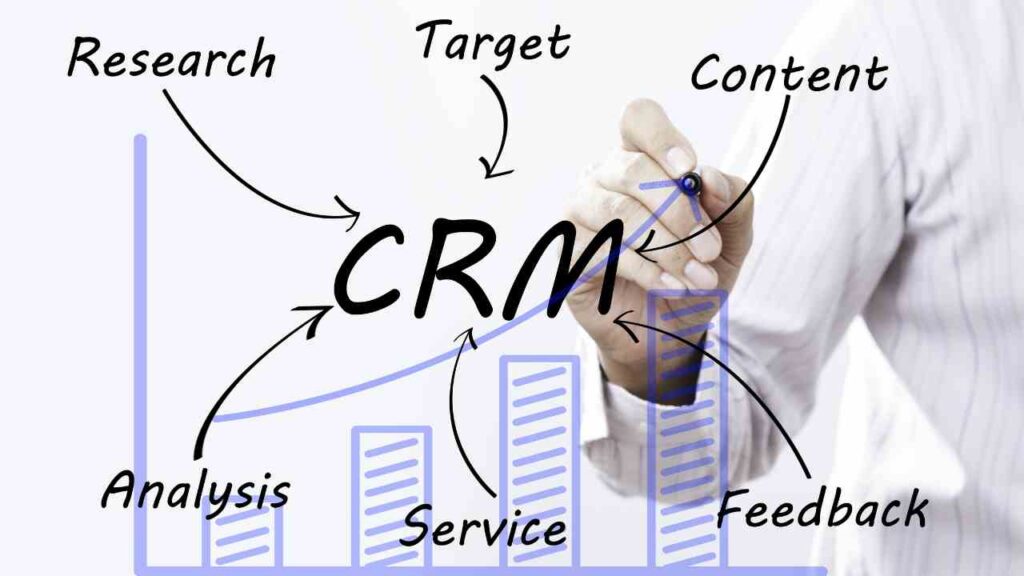Adopting CRM for Modernizing Sales Operations

In today’s fast-paced business environment, sales operations play a crucial role in the success of any organization. However, traditional sales processes and manual methods are no longer sufficient to meet the demands of modern customers. To stay competitive and drive growth, businesses need to adopt Customer Relationship Management (CRM) systems to streamline their sales operations. In this article, we will explore the benefits of adopting CRM for modernizing sales operations and how it can revolutionize the way businesses manage their customer relationships.
The Need for Modernizing Sales Operations
1. Changing Customer Expectations:
With the rise of digitalization and the internet, customers have become more informed and demanding. They expect personalized experiences, quick responses, and seamless interactions with businesses. Traditional sales processes often fail to meet these expectations, leading to dissatisfied customers and lost opportunities.
2. Inefficient Manual Processes:
Manual sales processes are time-consuming, error-prone, and lack scalability. Sales teams spend a significant amount of time on administrative tasks, such as data entry, lead management, and reporting. This reduces their productivity and hampers their ability to focus on building relationships and closing deals.
3. Lack of Visibility and Collaboration:
In traditional sales operations, information is often scattered across different systems, spreadsheets, and individuals. This lack of visibility makes it difficult for sales managers to track the progress of deals, identify bottlenecks, and make data-driven decisions. It also hinders collaboration among team members, leading to miscommunication and duplication of efforts.
The Benefits of CRM for Sales Operations
1. Centralized Customer Data:
A CRM system serves as a centralized repository for all customer-related information, including contact details, communication history, purchase history, and preferences. This enables sales teams to have a 360-degree view of their customers, allowing them to personalize interactions, anticipate needs, and provide better customer service. For example, if a customer calls with a query, the sales representative can quickly access their information and provide a tailored response, enhancing the customer experience.
2. Streamlined Sales Processes:
CRM systems automate and streamline various sales processes, reducing manual effort and improving efficiency. For instance, lead management can be automated, ensuring that leads are assigned to the right salesperson and followed up promptly. Sales representatives can also track their activities, such as calls, emails, and meetings, within the CRM system, eliminating the need for separate tools and spreadsheets. This streamlines the sales process, enabling sales teams to focus on selling rather than administrative tasks.
3. Improved Sales Forecasting and Reporting:
CRM systems provide real-time insights into sales pipelines, allowing sales managers to accurately forecast sales and make informed decisions. They can track the progress of deals, identify potential bottlenecks, and take proactive measures to ensure timely closures. Additionally, CRM systems generate comprehensive reports and analytics, providing valuable insights into sales performance, conversion rates, and customer behavior. This data-driven approach enables businesses to identify trends, optimize sales strategies, and drive revenue growth.
4. Enhanced Collaboration and Communication:
A CRM system facilitates collaboration and communication among sales team members. It allows them to share information, assign tasks, and track progress in a centralized platform. For example, if a sales representative is on leave, another team member can easily access their customer information and continue the conversation seamlessly. This improves teamwork, reduces miscommunication, and ensures a consistent customer experience.
Case Studies: Real-World Examples
1. Company XYZ:
Company XYZ, a leading software company, adopted a CRM system to modernize its sales operations. By centralizing customer data, they were able to provide personalized experiences to their clients. The CRM system automated lead management, resulting in faster response times and increased conversion rates. The sales team could easily track their activities and collaborate effectively, leading to improved productivity. As a result, Company XYZ experienced a 30% increase in sales revenue within the first year of implementing CRM.
2. Company ABC:
Company ABC, a manufacturing company, faced challenges in managing its sales operations due to manual processes and lack of visibility. After implementing a CRM system, they gained a holistic view of their customers and streamlined their sales processes. The sales team could track the progress of deals in real-time, enabling them to identify bottlenecks and take corrective actions. Company ABC witnessed a 20% reduction in sales cycle time and a 15% increase in customer satisfaction after adopting CRM.
Statistics on CRM Adoption
1. According to a study by Nucleus Research, businesses that adopt CRM systems experience an average return on investment (ROI) of $8.71 for every dollar spent on CRM implementation.
2. Salesforce, a leading CRM provider, reported that companies using CRM systems experienced an average 27% increase in lead conversion rates.
3. A survey conducted by Capterra found that 65% of businesses that adopted CRM systems reported improvements in sales quotas achieved.
Adopting CRM for modernizing sales operations is no longer a luxury but a necessity for businesses. It enables them to meet the changing expectations of customers, streamline sales processes, improve forecasting and reporting, and enhance collaboration among team members. Real-world examples and statistics demonstrate the tangible benefits of CRM adoption. To stay ahead in today’s competitive landscape, businesses should consider implementing a CRM system like SaasExpert.ca – Your All-In-One Sales and Marketing Platform for small businesses, agency owners, and marketers. By embracing CRM, businesses can revolutionize their sales operations and drive growth in the digital era.
Learn more about “Leveraging CRM to Optimize Sales Processes” right here.
Frequently asked questions about Adopting CRM for Modernizing Sales Operations.

1. Why is adopting a CRM important for modern sales operations? 🤔
Answer: Adopting a CRM is like giving your sales operations a digital makeover! 🚀 In today’s fast-paced business environment, customers expect rapid and personalized responses. A CRM helps you centralize customer data, making it easier to track interactions, forecast sales, and automate time-consuming tasks. This means your sales team can spend more time building meaningful relationships and less time juggling spreadsheets. Plus, with a CRM, you can leverage insights from data analytics to refine sales strategies and drive growth. In short, a CRM is the toolkit every modern sales team needs to stay competitive. 💼📈
2. What features should I look for in a CRM to modernize my sales operations? 🧐
Answer: Great question! When modernizing sales operations, consider these key features in a CRM:
Contact Management: 📇 Easily add, update, and segment contacts.
Sales Automation: ⚙️ Automate repetitive tasks like follow-ups and lead scoring.
Reporting & Analytics: 📊 Dive deep into sales performance metrics and customer insights.
Integration Capabilities: 🔗 Ensure it integrates seamlessly with your other business tools like email, calendar, and marketing platforms.
Mobile Accessibility: 📱 Access your CRM on-the-go, so your sales team can update information in real-time.
Always keep in mind your business’s unique needs. It’s not just about having cool features but ensuring those features genuinely add value to your sales operations!
3. How can a CRM help in boosting sales productivity? 📈
Answer: Think of a CRM as your sales team’s superpower! 🦸♂️ Here’s how:
Centralized Data: Everything’s in one place. No more searching through countless files and emails. 📂
Task Automation: Automate follow-ups, reminders, and lead assignments. This means less manual work and more time to close deals. ⏳➡️💰
Personalized Outreach: With a CRM, you can segment your audience and tailor your messaging, making every interaction feel personal and relevant. 💌
Collaboration Boost: Teams can collaborate seamlessly, share insights, and ensure no two members approach the same lead unknowingly. 🤝
Data-Driven Decisions: With powerful analytics, make decisions based on data, not hunches. This leads to smarter, more effective sales strategies. 🧠📊
4. Is it hard to train my sales team on a new CRM system? 🤷
Answer: While it can seem daunting, most modern CRM systems are designed with user-friendliness in mind! 🎉 Plus, many providers offer training resources, webinars, and support to ensure smooth onboarding. Remember, the initial learning curve is an investment. Once your team gets the hang of it, you’ll see a significant boost in efficiency and productivity. It’s all about patience, ongoing training, and embracing the change! 💪🌟
5. How does CRM integration with other tools impact modern sales operations? 🔧
Answer: Integration is like the magic wand of modern sales! 🪄 When your CRM seamlessly integrates with other tools, it creates a cohesive ecosystem where data flows effortlessly. This means:
Fewer Manual Entries: Automatically sync data from your email, calendar, and other tools. No more tedious data entry! 🚫🔢
Unified View: Get a 360-degree view of your customer from marketing interactions to sales touchpoints. 🔄👀
Streamlined Processes: Tools talk to each other, ensuring consistency, reducing errors, and speeding up processes. 🚀🔄
Enhanced Customer Experience: With integrated data, provide more personalized and timely interactions, leading to happier customers and better sales. 😊💼
So, by integrating your CRM with other tools, you’re not just adding functionality; you’re turbocharging your entire sales operation! 🚀🔥






